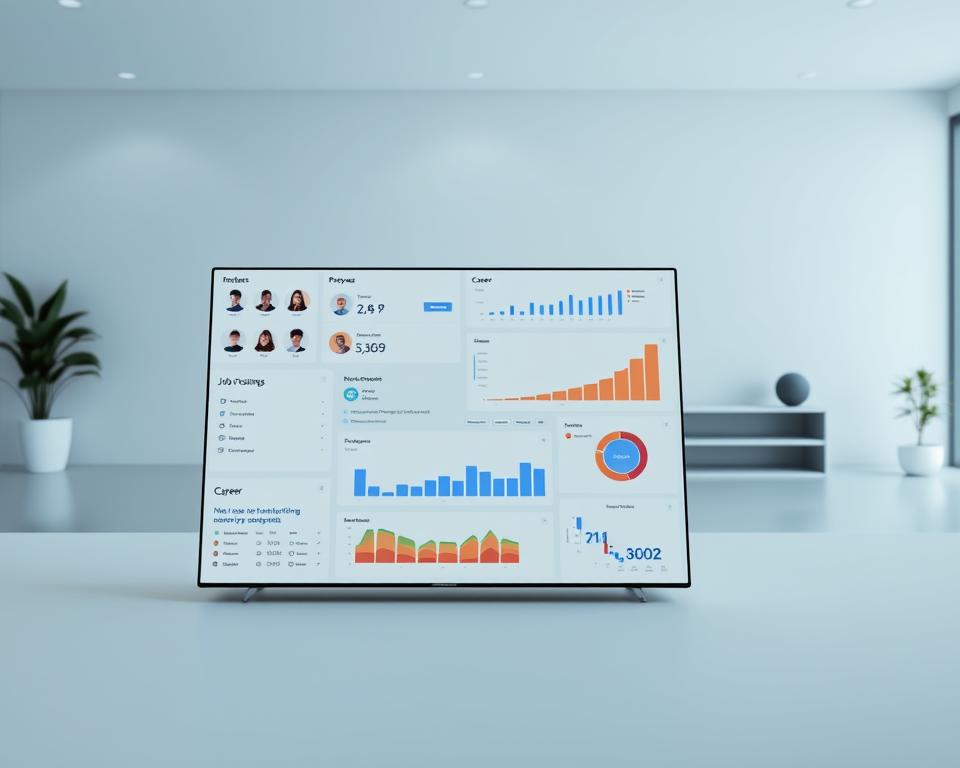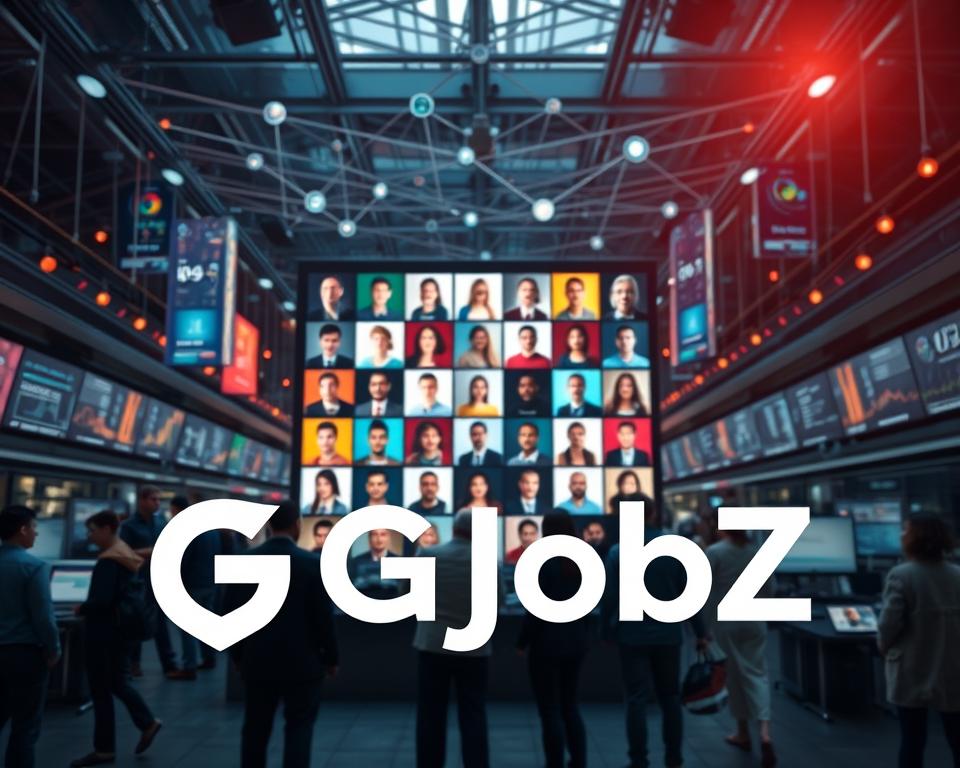
Best Software For Internal Mobility And Advancement
Career development tools are reshaping how organizations retain top performers. With 83% of HR leaders prioritizing internal talent movement, platforms that enable workforce flexibility now drive competitive advantage.
Choosing the right system requires more than vendor promises. Features like skills mapping, mentorship matching, and personalized learning paths separate basic tools from transformative solutions. This analysis compares leading options like Fuel50 and TalentGuard to help you identify what works.
Why does this matter? Employees promoted internally stay twice as long as external hires. Yet only 28% of companies have formal programs to facilitate role changes. Technology bridges this gap by making talent visibility and career pathing accessible at scale.
Key Takeaways
- Vendor claims often overlook integration challenges with existing HR systems
- Effective platforms reduce turnover by 40% through clear growth pathways
- Top solutions like iMocha emphasize skills analytics over static job boards
- Decision-makers need comparative data on AI matching accuracy
- Mobile-first design increases employee engagement by 62%
- Custom reporting separates strategic tools from basic tracking software
This guide cuts through marketing jargon to evaluate what truly enables career mobility. Discover how adaptive platforms create win-win scenarios: employees gain development opportunities while organizations build future-ready teams.
Introduction to Internal Mobility and Employee Development
Modern companies thrive when workers grow alongside them. 74% of engaged professionals say clear advancement opportunities keep them loyal to employers. This shift makes workforce development strategies critical for retention and operational agility.
Understanding Internal Mobility in Organizations
Internal mobility lets team members transition across roles, departments, or locations. Unlike traditional promotion ladders, it focuses on skills rather than tenure. Organizations using these strategies see 31% lower turnover compared to peers relying on external hires.
Effective systems highlight hidden capabilities through skills databases and mentorship networks. For example, a marketing specialist might excel in data analysis when given project opportunities. This approach turns stagnant teams into fluid talent pools.
| Metric | Internal Hiring | External Hiring |
|---|---|---|
| Retention after 2 years | 65% | 42% |
| Cost per hire | $1,200 | $4,700 |
| Time to productivity | 3 weeks | 12 weeks |
The Role of Career Advancement Software in Employee Growth
Specialized tools map competencies to open positions using AI-driven analytics. One healthcare provider reduced nurse attrition by 28% after implementing skills-matching technology. Workers received tailored upskilling plans aligned with organizational needs.
These platforms create visibility for both managers and staff. Real-time progress tracking helps identify high-potential individuals early. Personalized career paths increase engagement by 47% according to LinkedIn’s Workforce Learning Report.
“Our internal mobility rate tripled once employees saw available growth paths”
By aligning individual aspirations with company objectives, organizations build adaptable workforces ready for evolving challenges.
The Evolution of Internal Mobility Software
Workforce mobility strategies have undergone radical transformation since spreadsheet-based tracking dominated HR departments. Early systems relied on manual job postings and manager referrals, often overlooking 72% of qualified internal candidates according to Gartner research.

From Traditional Methods to AI-Driven Solutions
Legacy approaches struggled with three critical gaps: invisible skill sets, static career paths, and fragmented data. Modern mobility platforms solve these through machine learning that analyzes 360-degree employee profiles. Fuel50’s hyper-personalization engine, for example, processes 57 data points per worker to suggest role transitions.
| Aspect | Traditional Methods | AI-Driven Solutions |
|---|---|---|
| Skills Matching | Manual assessments | Real-time competency analysis |
| Career Path Visibility | Limited to org charts | Dynamic, personalized career maps |
| Integration Depth | Standalone systems | Unified HR ecosystem |
Leading manufacturers now use these tools to assemble project teams in hours instead of weeks. One aerospace company filled 89% of technical roles internally last year using AI-powered mobility software that identified hidden engineering talents.
“Our platform surfaces capabilities managers didn’t know existed within the organization,”
These advancements create fluid talent networks where employees explore growth opportunities aligned with business needs. As platforms evolve, they’re becoming strategic assets for building adaptable workforces ready for market shifts.
Key Features of Effective Internal Mobility Platforms
Forward-thinking organizations now prioritize dynamic talent ecosystems over static hierarchies. Modern platforms combine deep analytics with intuitive design to turn workforce data into growth opportunities.

Precision Skills Identification
Accurate skills assessment forms the backbone of effective talent strategies. Fuel50’s Talent Blueprint™ analyzes 120+ behavioral indicators to map hidden competencies, while iMocha’s AI-LogicBox cross-references certifications with real project performance.
- Automated skills validation reduces misplacement risks by 39%
- Multilingual support ensures global workforce compatibility
- Bias detection algorithms promote equitable opportunity distribution
Tailored Growth Roadmaps
Personalized career paths increase engagement by showing clear progression steps. A major telecom company saw 73% participation in leadership programs after implementing visual career maps.
Key features driving results:
- AI-curated learning recommendations based on role requirements
- Real-time mentorship matching across departments
- Talent marketplace interfaces for project-based mobility
These tools help managers make promotion decisions backed by 360-degree competency profiles. Organizations using integrated analytics report 22% faster role transitions and 41% higher retention in critical positions.
Unparalleled Roundup: Best Software For Internal Mobility And Advancement

Organizations seeking workforce agility now leverage specialized platforms to match employee capabilities with evolving needs. Three solutions stand out for distinct approaches to career growth and role optimization.
Fuel50: Hyper-Personalized Talent Matching
This enterprise-grade platform uses patented DNA Imprint™ technology to analyze 57 behavioral markers per employee. A global bank reduced external hiring costs by $2.8M annually after implementing Fuel50’s AI-driven internal job matching.
TalentGuard: Structured Career Architecture
Focusing on bias reduction, TalentGuard’s competency framework creates standardized promotion criteria. Healthcare clients report 34% faster leadership pipeline development through transparent progression metrics.
iMocha: Objective Skills Verification
With 3,000+ skill assessment templates, iMocha validates technical capabilities through real-world simulations. IT firms using their platform achieve 91% accuracy in role placements compared to traditional interviews.
| Platform | Core Strength | Best For | Key Metric |
|---|---|---|---|
| Fuel50 | AI personalization | Large enterprises | 63% faster redeployment |
| TalentGuard | Career path structure | Regulated industries | 41% bias reduction |
| iMocha | Skills validation | Technical roles | 89% assessment accuracy |
Manufacturing teams needing rapid reskilling often choose Fuel50, while TalentGuard suits organizations building standardized career ladders. For objective technical evaluations, iMocha’s approach proves unmatched.
Most vendors offer customized demonstrations – booking a trial reveals which solution aligns with your talent mobility goals.
Additional Leading Internal Mobility Platforms
Innovative workforce solutions now extend beyond traditional promotion systems. These tools help organizations tap into underutilized skills while maintaining cultural cohesion.

Hitch Works: Agile Project Staffing and Team Assembly
This mobility platform uses machine learning to match employees with short-term initiatives. One logistics company reduced project staffing time by 65% through Hitch Works’ AI-driven team builder. The system analyzes skills, availability, and peer feedback to create balanced cross-functional groups.
Symphony Talent: Brand-Driven Career Pathing
Unlike standard tools, Symphony integrates employer branding with internal mobility. Their approach increased retention by 29% at a consumer goods firm by aligning role transitions with company values. Employees see curated opportunities that reinforce organizational mission and individual purpose.
Key advantages of these solutions:
- Real-time visibility into internal candidates for urgent projects
- Automated skills validation across departments
- Brand storytelling woven into career development
When combined with traditional systems, these platforms create a layered talent strategy. They prove particularly effective for organizations needing rapid response teams or cultural alignment during growth phases.
Benefits of Implementing Internal Mobility Software
Organizations leveraging modern workforce tools unlock dual advantages: stronger employee commitment and measurable financial gains. These systems transform static teams into dynamic talent pools while addressing critical business challenges.

Boosting Employee Engagement and Retention
Workers stay 2.1x longer when companies provide visible career paths. Platforms highlighting growth opportunities reduce turnover by 40% through real-time skills mapping and mentorship alerts. A retail chain saw 73% participation in leadership programs after implementing role transition dashboards.
Key engagement drivers include:
- Personalized upskilling plans aligned with organizational needs
- Transparent promotion criteria reducing favoritism concerns
- Mobile access to internal job markets 24/7
“Our exit interviews changed dramatically – 68% of retained staff cited career visibility as their main reason for staying.”
Cost Savings and Optimized Talent Deployment
Filling roles internally slashes hiring expenses by 60% compared to external recruitment. Workforce analytics minimize downtime by matching underutilized skills to urgent projects within hours.
| Metric | Internal Hiring | External Hiring |
|---|---|---|
| Average Cost | $1,800 | $4,900 |
| Time-to-Productivity | 11 days | 34 days |
| Success Rate (2 years) | 82% | 57% |
Manufacturers using talent mobility tools report 22% faster project staffing and 31% lower training costs. This agility lets companies pivot quickly during market shifts while maintaining institutional knowledge.
Strategic Considerations for Choosing Mobility Platforms

Selecting career development tools demands more than feature comparisons. Leaders must ensure technology supports workforce planning while meeting employee growth needs. 83% of successful implementations tie platform capabilities directly to leadership priorities and performance metrics.
Aligning Technology with Organizational Goals
Start by mapping platform features to three-year talent strategies. Can the system adapt to evolving skills requirements? Does it integrate with existing management tools like HRIS or learning systems? A financial services firm improved promotion accuracy by 37% after choosing software that syncs with their competency frameworks.
Key evaluation criteria include:
- Real-time skills tracking across departments
- Customizable career paths reflecting company structure
- Analytics dashboards for succession planning
Ask strategic questions during demos:
- How does the platform handle lateral moves versus promotions?
- Can managers create personalized development plans?
- What metrics prove ROI in retention or role readiness?
“We rejected flashy interfaces for solutions showing direct links between career mobility and revenue growth.”
Balance innovation with proven management practices. While AI-driven suggestions improve matching, maintain human oversight for complex decisions. Platforms should enhance – not replace – leadership judgment in career progression.
Can Remote Coding Bootcamps Help Employees with Internal Mobility and Advancement?
In today’s competitive job market, employees seeking advancement can greatly benefit from skill development. For those looking to enhance their coding abilities and career prospects, it’s essential to explore remote coding bootcamps in california. These programs offer flexible learning, enabling professionals to acquire new skills and improve internal mobility within their organizations.
How Can Software for Internal Mobility Assist in Reskilling Employees Through Prompt Engineering Courses?
Software for internal mobility can significantly enhance employee reskilling by offering access to top courses for mastering prompt engineering skills. By tailoring training opportunities to individual career paths, organizations can empower their workforce, ensuring they stay competitive and engaged in an evolving job market while advancing their technical capabilities.
Conclusion
Modern talent strategies thrive when companies unlock potential within their organization. Platforms enabling internal mobility transform static workforces into agile networks where skills meet evolving business needs. From Fuel50’s AI-powered matching to iMocha’s precision skills validation, each solution offers distinct paths to align career aspirations with operational goals.
These tools deliver measurable impact: 40% lower turnover, 60% cost savings on hiring, and 3x faster role transitions. Leaders gain data-driven insights to identify hidden capabilities, while employees access transparent personalized career roadmaps. The result? A culture where growth opportunities fuel both individual and organizational success.
Assess your current approach. Do your systems provide real-time skills visibility? Can managers quickly match talent to critical roles? Leading platforms address these gaps through adaptive design and predictive analytics.
Ready to modernize your strategy? Schedule consultations with top vendors to experience how talent mobility solutions work in practice. The right investment today builds tomorrow’s resilient, future-ready workforce.